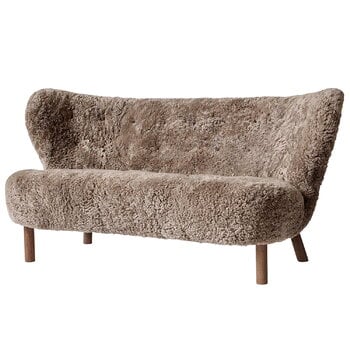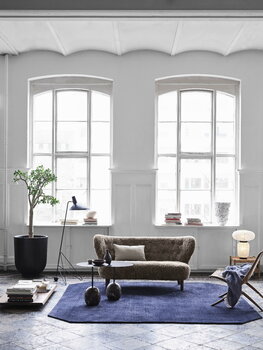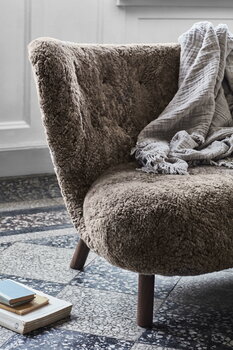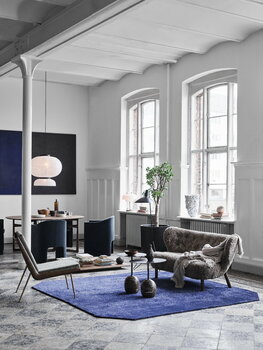&Tradition’s Little Petra sofa charms with its compact size, flowing silhouette and soft sheepskin upholstery. Little Petra is based on sketches the Danish architect Viggo Boesen and named after Boesen’s mother-in-law. With its simple and organic appearance, Little Petra is a lovable example of high-quality furniture and the Danish funkis style of the 1930s. Thanks to &Tradition’s new production, Little Petra is now available to all design enthusiasts around the globe.
Little Petra VB2 sofa, Sahara Curly sheepskin - oiled walnut
&Tradition
Description
&Tradition’s Little Petra sofa charms with its compact size, flowing silhouette and soft sheepskin upholstery. Little Petra is based on sketches the Danish architect Viggo Boesen and named after Boesen’s mother-in-law. With its simple and organic appearance, Little Petra is a lovable example of high-quality furniture and the Danish funkis style of the 1930s. Thanks to &Tradition’s new production, Little Petra is now available to all design enthusiasts around the globe.
Product details (12)
- Colour
- Brown, walnut
- Width
- 59.06 in (150 cm)
- Depth
- 32.68 in (83 cm)
- Height
- 29.53 in (75 cm)
- Seat depth
- 21.65 in (55 cm)
- Seat height
- 15.75 in (40 cm)
- Frame material
- Solid beech, plywood
- Seat cushion
- HR foam, polyester wadding
- Backrest cushion
- HR foam and polyester wadding
- Upholstery fabric
- Scandilock Sahara Curly 17 mm: Australian sheepskin with curly character and high density. The skin is naturally curly but the structure of the wool can vary both with regard to the curls and the color tones.
- Weight
- 77.16 lbs (35 kg)
- Notes
- The legs are fitted with felt glides as standard.
- Product ID
Designer
Viggo Boesen was a Danish architect who had a great influence on the Danish functionalism of the 1930s and 1940s. The most essential elements in his work were the use of rattan and different upholsteries, that gave a light and organic touch for his furniture and other designs. One of his best known pieces is the awarded Fox lounge chair, which was made of rattan and released in 1936.
View all productsReviews (1)
5
Based on 1 reviews
-
A
anonyymi
Finland
418 days ago
Sustainability
The Product Sustainability Framework, our criteria of sustainable design, helps you find the most sustainable products in our selection. Read below which sustainability criteria this product has met.
Working conditions & labour 8/9
-
Equal opportunities for all employees
-
Commitment to UN Global Compact, fair compensation for all employees
-
Corporate responsibility requirements defined and communicated for suppliers
-
Systematic work for improved inclusion and well-being in the workplace
-
Transparent supply chain
-
Suppliers' compliance to a code of conduct ensured
-
Direct suppliers audited and certified
-
Compliance to the UN Guiding Principles on Business and Human Rights ensured in the supply chain
-
Support for community involvement in the supply chain
Eco-friendly production 6/9
-
Fair and resource-wise water-use in production
-
No incineration or landfilling of returned items
-
No use of endangered species as materials
-
No direct environmental emissions or waste (excl. GHGs) from production
-
Material-efficient and ecological packaging
-
No potentially harmful chemicals used in own production
-
The sustainability of direct suppliers' production is addressed and monitored
-
Production and material sourcing that respect biodiversity, animal rights, and natural ecosystems
-
Positive impact on nature’s well-being through operations that regenerate natural ecosystems
Climate impact 5/8
-
Company's direct greenhouse gas emissions identified and commitment to reduction
-
Product's carbon impact identified and commitment to reduction
-
Guidance on energy- and eco-efficient use of the product
-
Contribution to climate initiatives beyond the brand’s direct operations
-
100 % renewable energy in own production and operations
-
Low-carbon or compensated transportation
-
Carbon footprint of the product calculated and goals set to reduce it
-
Carbon neutral or carbon negative product
Sustainable materials 3/6
-
Sustainable and long-lasting material choices
-
No harmful or hazardous substances
-
Responsible raw material sourcing and production
-
Materials suited for circularity: monomaterials, recyclable finishings, renewable or recycled contents etc.
-
Ecological materials: natural, biodegradable, recyclable or recycled contents
-
Outstanding materials in terms of innovativeness, responsibility, sustainability and circularity: local production or sourcing, 100 % recycled content, C2C-certification etc.
Circular design 4/5
-
High aesthetic quality promoting long-term use of the product
-
Technically durable product design and material choices
-
Design for enduring life-long quality
-
Design and support for product maintenance, repair and upgradability
-
Innovative circular design solutions: circular service system, resale platform, remanufacturing, collection of used products, etc.












